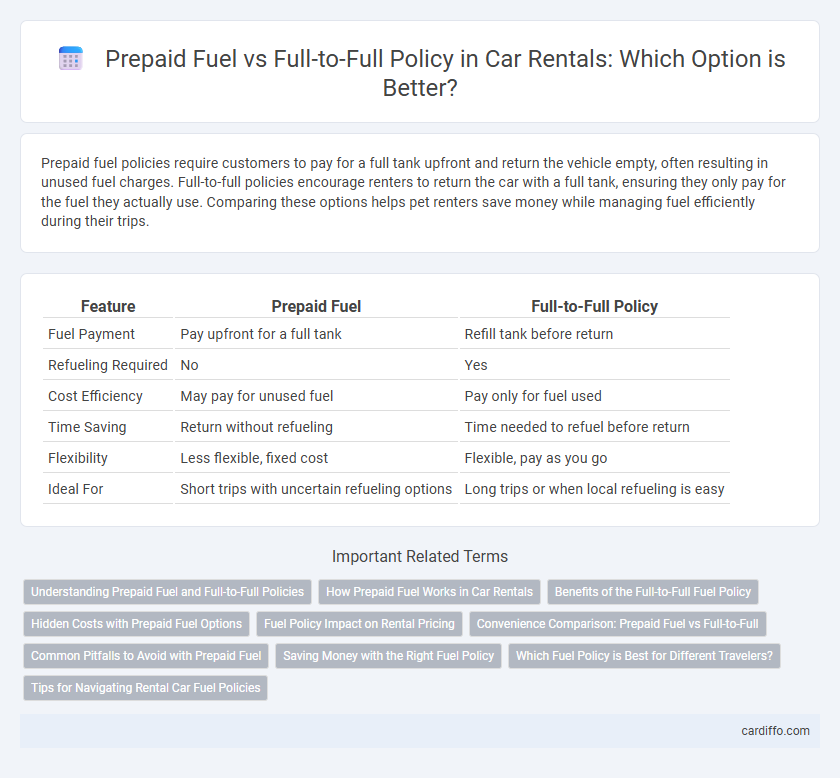Prepaid fuel policies require customers to pay for a full tank upfront and return the vehicle empty, often resulting in unused fuel charges. Full-to-full policies encourage renters to return the car with a full tank, ensuring they only pay for the fuel they actually use. Comparing these options helps pet renters save money while managing fuel efficiently during their trips.
Table of Comparison
| Feature | Prepaid Fuel | Full-to-Full Policy |
|---|---|---|
| Fuel Payment | Pay upfront for a full tank | Refill tank before return |
| Refueling Required | No | Yes |
| Cost Efficiency | May pay for unused fuel | Pay only for fuel used |
| Time Saving | Return without refueling | Time needed to refuel before return |
| Flexibility | Less flexible, fixed cost | Flexible, pay as you go |
| Ideal For | Short trips with uncertain refueling options | Long trips or when local refueling is easy |
Understanding Prepaid Fuel and Full-to-Full Policies
Prepaid fuel policies allow renters to pay upfront for a full tank of fuel, often providing convenience though possibly at a higher cost compared to actual consumption. Full-to-full policies require renters to return the vehicle with the same fuel level as at pickup, promoting fair fuel usage charges based on the exact amount consumed. Understanding these options helps renters choose between upfront convenience and potentially lower fuel costs aligned with real consumption during the rental period.
How Prepaid Fuel Works in Car Rentals
Prepaid fuel in car rentals allows customers to purchase a full tank of fuel upfront at a fixed rate, enabling the convenience of returning the vehicle with an empty tank without refueling. This policy eliminates the need to stop at a gas station before returning the car, saving time and avoiding potential fuel price fluctuations. However, unused fuel is typically non-refundable, so renters should estimate their fuel consumption carefully to avoid overpaying.
Benefits of the Full-to-Full Fuel Policy
The full-to-full fuel policy offers renters the benefit of paying only for the fuel they use, eliminating the risk of overcharges commonly associated with prepaid fuel options. This approach ensures transparency and control, allowing customers to return the vehicle with the fuel tank at the same level as at pickup, avoiding unnecessary costs. Clients appreciate the fairness and potential savings, making full-to-full a preferred choice in car rental fuel policies.
Hidden Costs with Prepaid Fuel Options
Prepaid fuel rental options often appear convenient but can hide significant extra costs, such as paying for a full tank regardless of the amount used. Unlike the full-to-full policy, where customers only pay for the fuel they consume, prepaid options may include inflated fuel prices and hidden fees that lack transparency. Renters should carefully assess these charges to avoid unexpected expenses and better manage their rental budget.
Fuel Policy Impact on Rental Pricing
Prepaid fuel policies often result in higher upfront rental costs as customers pay for a full tank regardless of usage, which can lead to overcharging if the vehicle is returned with less fuel. Full-to-full policies generally offer more transparent pricing by requiring renters to return the car with the same fuel level, thereby avoiding extra fuel charges and promoting cost efficiency. Understanding the differences in fuel policies is essential for renters to assess the true cost of the rental and manage expenses effectively.
Convenience Comparison: Prepaid Fuel vs Full-to-Full
Prepaid fuel offers the convenience of returning the rental car without refueling, saving time at the end of the rental period. Full-to-full policy requires renters to refill the tank before return, ensuring charges only for the fuel used, which often proves more cost-effective. Choosing between these options depends on prioritizing ease of use versus potential fuel cost savings.
Common Pitfalls to Avoid with Prepaid Fuel
Prepaid fuel plans often lead to customers paying for more fuel than they use, resulting in unnecessary extra costs. Many renters overlook unclear refund policies on unused fuel, causing potential disputes and financial loss. Always verify the fuel tank level at pickup and return to avoid hidden charges or double billing under prepaid fuel agreements.
Saving Money with the Right Fuel Policy
Choosing a full-to-full fuel policy often saves renters money by allowing them to pay only for the fuel they use, avoiding inflated refueling charges. Prepaid fuel options may seem convenient but can result in overpaying if the tank isn't completely emptied. Understanding the cost implications and carefully selecting the fuel policy aligns with budget-friendly rental practices.
Which Fuel Policy is Best for Different Travelers?
Prepaid fuel policies offer convenience for travelers who prefer a fixed price and hassle-free refueling, making them ideal for short trips or those with unpredictable driving distances. Full-to-full policies benefit travelers who want to pay only for the fuel they use, providing cost savings for longer trips or those willing to refuel before returning the vehicle. Choosing the best fuel policy depends on trip length, budget, and personal preference, with prepaid options favoring simplicity and full-to-full policies rewarding fuel economy.
Tips for Navigating Rental Car Fuel Policies
When renting a car, understanding the difference between prepaid fuel and full-to-full policies can save you money and hassle. Opt for a full-to-full policy to pay only for the fuel you use by refilling the tank before returning the vehicle, avoiding inflated fuel charges common with prepaid plans. Always inspect the fuel gauge at pick-up and return, keep receipts for fuel purchases, and ask the rental company about their exact fuel policy terms to navigate charges effectively.
Prepaid fuel vs full-to-full policy Infographic

 cardiffo.com
cardiffo.com